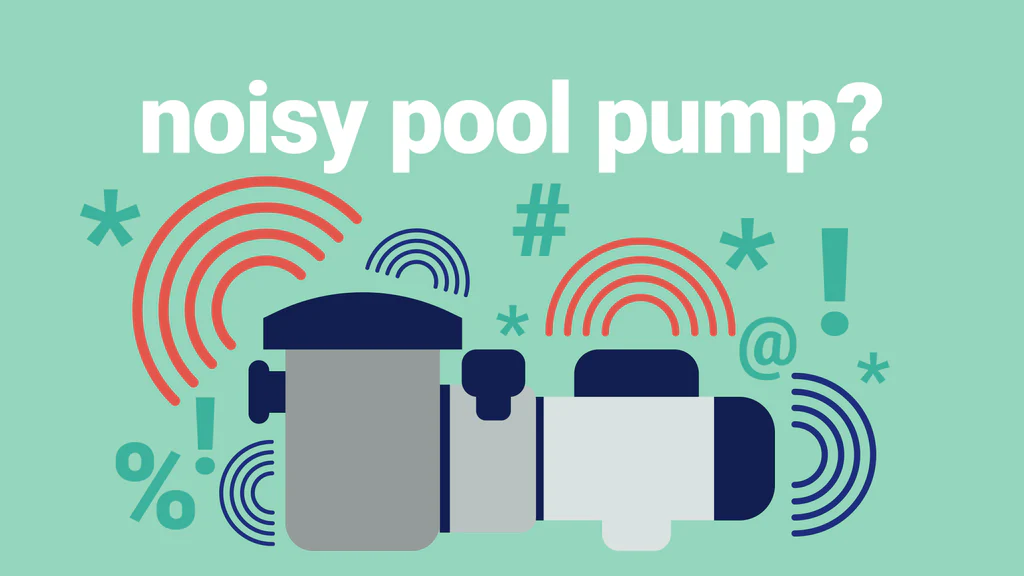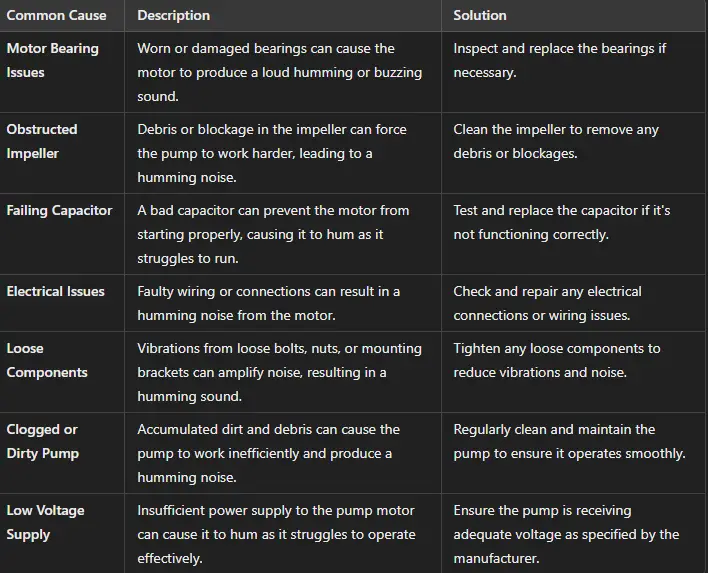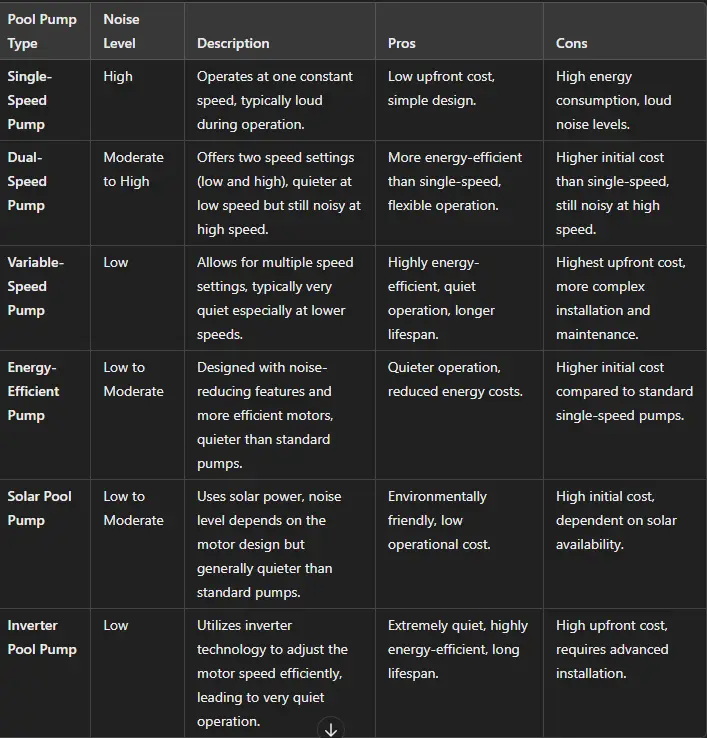When you own a swimming pool, you should make a simple daily inspection to ensure that the filter system is running correctly and that the baskets, skimmers, and pump motor are clear of any debris that will clog the filter and any electrical problems the pump motor can cause. Why is my Pool Pump making noises?
- Worn Bearings: Damaged motor bearings
- Blocked Impeller: Debris obstructing impeller
- Failing Capacitor: Faulty start/run capacitor
- Electrical Issues: Faulty wiring
- Overheating: Motor overheating
- Low Voltage: Inadequate power supply
- Loose Components: Vibrations from loose parts
- Cavitation: from Pressure drops
When a pump motor buzzes, you mustn’t allow it to run for too long. This could be an indication that the motor is overloaded. If the pump is making a buzzing noise, you should immediately turn it off before the motor burns out. Usually, the capacitor has failed to result in the buzzing sound. The capacitor is what serves the motor power. Another cause of the buzzing is that the motor has seized.
Pool Pump Noises
A loud buzzing noise coming from your pool pump can be alarming and may indicate several potential issues. The most common cause is a problem with the motor, such as a loose or damaged motor bearing, which can produce a persistent buzzing sound. Another possibility is that debris or a blockage is obstructing the impeller, causing it to work harder and generate noise.
Electrical issues, such as a failing capacitor, can also result in a loud buzz as the motor struggles to start or run properly. Additionally, vibrations from loose components or mounting brackets can amplify the noise. To address this issue, it is crucial to turn off the pump and inspect it for visible problems or consult a professional to diagnose and fix the underlying cause to prevent further damage.
If you’re hearing a loud buzzing noise coming from your pool pump, you’re not alone. Various issues could cause your pool pump to emit a humming sound, turning your pool area into a noisy annoyance. One of the most common reasons for a pool pump making a loud noise is a malfunction in the pump’s motor. The humming noise might be due to electrical issues within the pump. A failing capacitor is another frequent culprit, contributing to that annoying buzzing sound you’re experiencing.
Faulty bearings within the pump can also generate a noisy environment, making it difficult to enjoy your pool time. Additionally, if your pump’s shaft is misaligned, it could lead to extra noise during operation. Other causes include an imbalanced impeller or cavitation within the pump, each influencing how loud your pool pump becomes. Understanding these issues can help you diagnose and address the cause of your noisy pool pump, so you can return to enjoying the tranquility of your swimming pool without that incessant humming interruption.
Common Causes of Pool Pump Humming Sounds
If your pool pump is making a loud humming noise, don’t worry, it’s a common issue with several potential causes. One frequent culprit behind the pump humming could be a clogged impeller. When debris gets stuck, it causes a restriction, leading to that frustrating hum. Another common cause is air trapped in the system; when air gets sucked into the pump, it creates noises that resemble a buzzer.
Additionally, electrical issues such as a faulty capacitor or bad wiring connections can result in a pump’s humming sound. Sometimes, the motor bearings wear out, causing the pump to buzz excessively. Incorrect pump placement and alignment can also contribute to the noise, as vibrations may amplify when the pump isn’t properly situated. Finally, cavitation within the pump can cause humming and other noises due to the presence of steam bubbles. Understanding these common causes can help you diagnose and fix the problem, ensuring your pool stays peaceful and enjoyable.
Swimming Pool Pump Motor Issues Causing Noise
When your pool pump is producing a loud humming noise, it’s often a sign there’s something wrong with the pump motor. One common issue is a seized motor; this can occur if debris gets stuck or if there’s a lack of lubrication, preventing the pump motor from turning properly. Another issue could be electrical, where the motor’s wiring or components are damaged or deteriorating. At times, the pump motor hums because it’s struggling to run due to internal blockages or faulty bearings.
Regular maintenance and timely inspections can help identify and fix these problems before a seized or malfunctioning motor causes extensive damage to your pool pump. Don’t ignore persistent humming noises; addressing them promptly helps ensure your pool pump runs smoothly and efficiently. If you’re unsure what’s causing your pool pump to hum, consider calling a professional who can accurately diagnose and repair the problem. Being proactive about your pump motor’s health keeps your pool pump in top shape.

Understanding Pump Capacitor Failures
One of the key components often overlooked when diagnosing a noisy pool pump is the pump capacitor. When the pump capacitor starts to fail, it can lead to a myriad of issues, the most noticeable being that loud humming noise coming from your pump. A bad capacitor can prevent the motor from starting up properly or running efficiently. This malfunction results in the pump motor struggling to operate, causing a persistent humming sound that’s both annoying and alarming.
If you’re experiencing this issue, it’s crucial to inspect the capacitor sooner rather than later. Ignoring this could lead to more extensive damage, not only worsening the noise but also risking the longevity of your pool pump. By understanding the role of the capacitor and the signs of a bad capacitor, you can take timely action to replace it, ensuring that your pool pump runs smoothly and quietly. Regular maintenance checks on your pump capacitor can prevent these problems, keeping your pool experience enjoyable and serene.
Pump Bearing Problems Leading to a Noisy Pool Pump
One of the most common culprits behind a noisy pool pump is issues with the pump bearings. When bearings wear out or become damaged, they can cause excessive vibrations, leading to a loud humming noise. These vibrations not only affect the overall performance of the pump but can also create a significant amount of sound that’s both irritating and concerning. It’s crucial to address these bearing problems quickly, as ignoring them may result in further damage to your pool pump.
This noise often indicates that the pump needs immediate attention to avoid complete failure. Over time, even minor issues with bearings can intensify, causing more severe vibrations and louder noise. If you’re dealing with an unusually noisy pool pump and suspect bearing problems, it’s best to consult a professional for a thorough inspection and necessary repairs. Don’t let excessive vibrations and loud noise disrupt your pool experience; take action early to ensure your pump operates smoothly and quietly.

Is a Misalignment of the Pump Shaft Creating Noises
Is your pool pump making a loud humming noise? One common cause could be the misalignment of the pump shaft. When the shaft isn’t properly aligned with the pump motor, it can create a lot of noise and vibrations. Shaft misalignment can occur due to improper installation or regular wear and tear.
A bent shaft might also contribute to the noise, as it disrupts the smooth operation of the pump. If you notice your pool pump making unusual sounds, it’s crucial to check for any misalignments or visible signs of a bent shaft. Ignoring these issues could lead to further damage and even more intense noise levels. To resolve the issue and ensure your pump operates quietly and efficiently, you might need to realign the pump shaft or replace a bent shaft. Regular maintenance can help prevent these alignments from occurring and keep your pool pump running smoothly. Don’t let a noisy pool pump disrupt your peace; address shaft misalignment issues promptly.
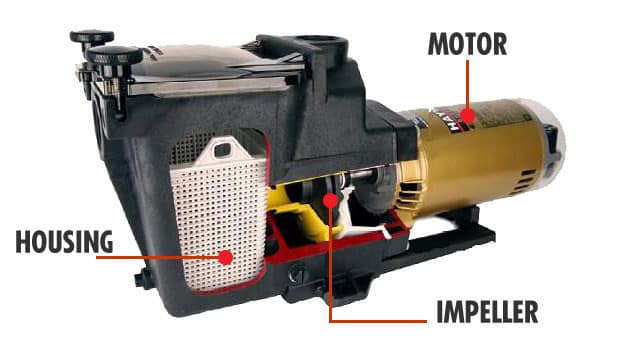
How an Imbalanced Pump Impeller Affects Noise Levels
An imbalanced pump impeller can significantly affect the noise levels in your pool pump, causing it to make loud buzzing sounds and vibrations. When the pump impeller is not balanced properly, it can lead to uneven distribution of water flow, which creates unnecessary strain on the pool pump system. This strain causes the pump to generate loud noise, making it evident that something is not right.
The vibrations from an imbalanced pump impeller can further contribute to the noise, as they resonate through the entire pump setup. This constant buzzing noise doesn’t just indicate that the pump impeller isn’t working efficiently; it also signals potential wear and tear on other pool pump components. Routine maintenance and professional inspection can help identify if your pump impeller is the culprit behind the loud noises. By addressing the imbalance, you can prevent the pump from making excessive noise and ensure the longevity of your pool pump system, leading to a quieter, more enjoyable swimming experience.
If you are not comfortable working on the pump motor then Get someone that is!
The Role of Cavitation in Pump Noises
Cavitation plays a significant role in the loud humming noise your pool pump might be making. When cavitation occurs, it’s typically due to the formation of vapor bubbles in the pump’s impeller. These bubbles collapse near the pump’s surface, creating tiny but intense shockwaves that result in noise.
This is not just any sound; the collapsing bubbles produce a loud and potentially damaging noise. Cavitation can be caused by several factors, including inadequate water flow to the pool pump or air entering the pump system. Ensuring that your pool’s water level is adequate and that all valves are properly sealed can help reduce the impact of cavitation noises. Moreover, installing a filter to manage debris will prevent the blockages that often contribute to cavitation.
Cavitation plays a significant role in causing pump noises, often leading to a distinct and disruptive sound. Cavitation occurs when the pressure within the pump falls below the vapor pressure of the liquid, causing vapor bubbles to form. These bubbles are then carried along with the liquid until they reach a region of higher pressure where they collapse or implode. The implosion of these vapor bubbles generates shock waves that produce a loud noise, often described as a rattling or grinding sound.
This phenomenon not only creates an unpleasant auditory disturbance but can also cause substantial damage to the pump’s components, such as the impeller and housing, due to the high-energy impacts of the collapsing bubbles. Persistent cavitation can reduce the efficiency of the pump, lead to increased wear and tear, and ultimately shorten the lifespan of the equipment. Therefore, addressing cavitation promptly through proper pump selection, maintenance, and operation is crucial to maintaining optimal pump performance and minimizing noise.
Ignoring these signs can lead to more serious problems within the pump’s internal mechanisms, so addressing cavitation promptly is essential for maintaining a quiet and efficient pool pump. If your pool pump is buzzing loudly, cavitation may very well be the culprit.
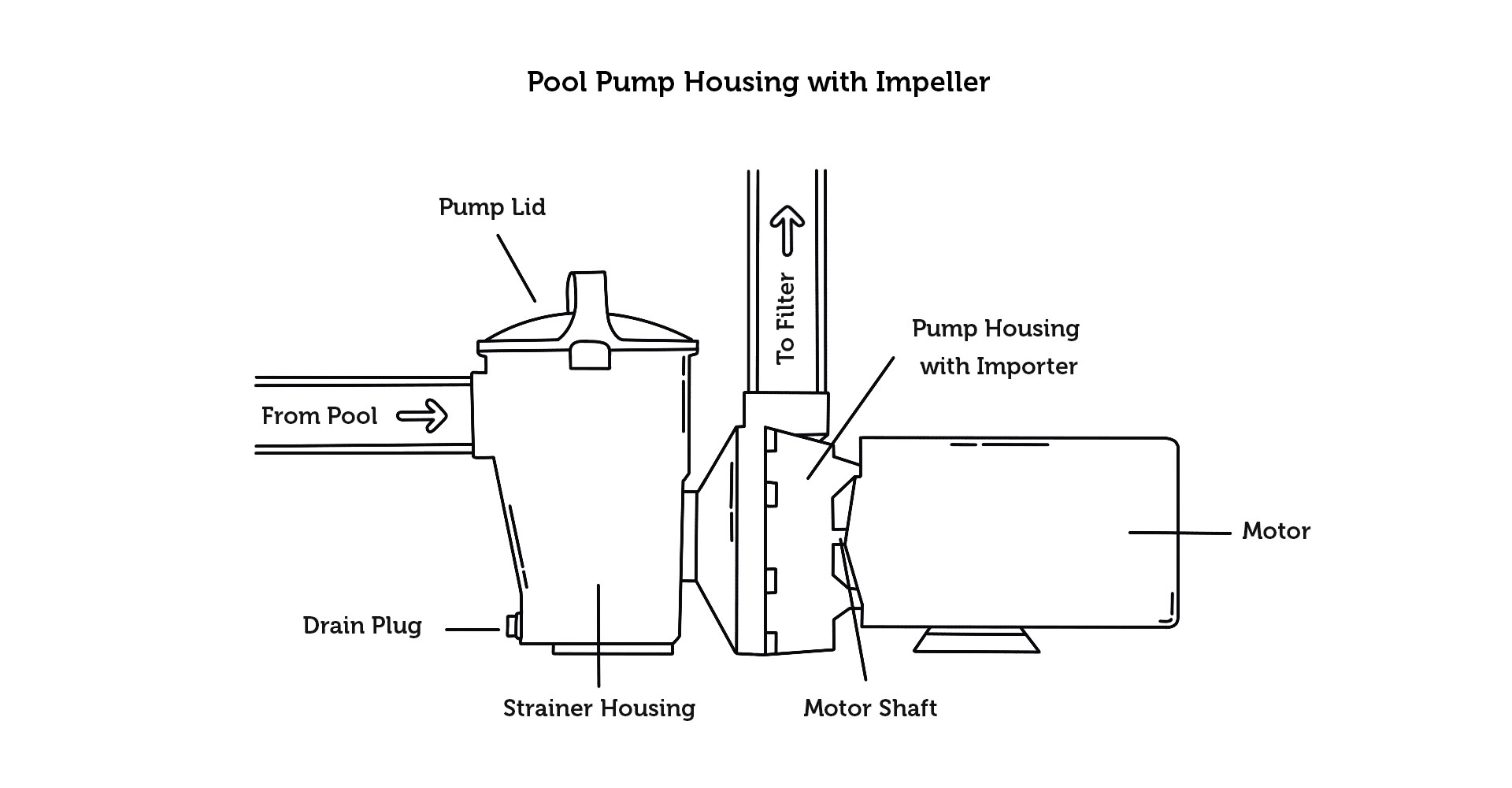
Pump Flow Pulsation and Its Impact on Loud Noises
When maintaining a pool, dealing with loud noises can be quite a headache. One common issue pool owners experience is the noisy operation of the pool pump, often caused by flow pulsation. Flow pulsation refers to the irregular movement of water through the pump, leading to vibrations that amplify the noise.
When the pump’s flow isn’t steady, these pulsations cause loud humming noises that can alert you to underlying issues. The constant vibrations from the pump due to flow pulsation not only make for an uncomfortable pool area but can also indicate deeper mechanical problems.
Over time, these issues can cause wear and tear on the pump’s internal components, making the pump noisy and less efficient. To reduce the noise and ensure your pool pump operates smoothly, it’s crucial to address flow pulsation and its underlying causes promptly. Regular maintenance checks can help identify and resolve the sources of these disruptive noises, ensuring the pool remains a serene spot for relaxation.
Comparing Different Pool Pumps and Their Noise Levels
When it comes to ensuring a serene and peaceful pool experience, understanding the differences in noise levels among various pool pumps is crucial. Pool owners often find themselves bewildered when their pool pump starts to produce an unexpected hum, hum, buzz, or other disruptive sound.
Comparing the noise levels of different pool pumps can help identify a quieter option that meets your needs. Factors like pump motor quality, design, and materials play significant roles in how much noise a pump might generate.
Some pool pumps are specifically designed to operate more quietly, making them ideal for residential areas where maintaining a tranquil ambiance is paramount. In comparing pump noise levels, it’s also important to consider the environment where the pump will be installed. Understanding why certain pumps are louder than others and how the sound levels might affect your swimming pool experience can guide you toward making an informed choice. By selecting a quieter pump, you can significantly reduce the noise pollution around your pool area and enjoy a more relaxing atmosphere.
This table compares different types of pool pumps based on their noise levels, providing descriptions, pros, and cons to help choose the best option for specific needs.
Conclusion:
In conclusion, the type of pool pump you choose significantly affects the noise levels and overall efficiency of your pool system. Single-speed pumps, while cost-effective, tend to be the loudest and least energy-efficient. Dual-speed pumps offer a balance with quieter operation at low speeds but can still be noisy at higher speeds. Variable-speed pumps, though the most expensive upfront, provide the quietest and most energy-efficient option, allowing for customizable speed settings that reduce noise.
Energy-efficient and solar pool pumps also offer quieter operation and lower energy costs, but they come with higher initial investments. Inverter pool pumps represent the pinnacle of quiet and efficient operation, although they require a more complex installation and a higher initial expense. Understanding these differences can help pool owners make informed decisions to achieve a quieter, more efficient pool system that fits their specific needs and budget.
References:
Pool Supplies- Why is my Pool Pump Buzzing?
FAQ’s
Why is my pool pump making a loud buzzing noise?
A loud buzzing noise from your pool pump can be due to issues such as worn or damaged motor bearings, an obstructed impeller, a failing capacitor, electrical problems, or loose components. It’s essential to inspect the pump and address these issues promptly to prevent further damage.
2. What are the common causes of a humming noise in my pool pump?
Common causes include worn or damaged motor bearings, a failing capacitor, electrical issues, an overheating motor, an imbalanced motor shaft, a dirty or clogged motor, and an insufficient voltage supply.
3. What is cavitation, and how does it affect my pool pump?
Cavitation occurs when the pressure inside the pump falls below the liquid’s vapor pressure, causing vapor bubbles to form and then collapse, creating a loud noise and potentially damaging the pump’s components. It reduces pump efficiency and can lead to increased wear and shorter equipment lifespan.
4. How do different types of pool pumps compare in terms of noise levels?
Single-speed pumps are typically the loudest, while dual-speed pumps are quieter at low speeds but still noisy at high speeds. Variable-speed pumps are the quietest and most energy-efficient. Energy-efficient and solar pool pumps offer quieter operation but at a higher initial cost. Inverter pool pumps are extremely quiet and efficient, though they also have a high upfront cost and require advanced installation.
5. What can I do to reduce the noise level of my pool pump?
To reduce noise, you can ensure the pump is properly maintained, replace worn bearings, clear debris from the impeller, ensure the motor receives adequate voltage, tighten loose components, and consider upgrading to a quieter, more efficient pump type such as a variable-speed or inverter pump.
6. Is it worth investing in a variable-speed or inverter pool pump?
Yes, despite the higher initial cost, variable-speed and inverter pool pumps offer significant advantages, including quieter operation, higher energy efficiency, and longer lifespan. They can lead to substantial savings on energy bills over time and provide a more pleasant pool environment.
7. Can electrical issues cause my pool pump to make noise?
Yes, electrical issues such as faulty wiring or a failing capacitor can cause the motor to struggle, resulting in humming or buzzing noises. It’s important to check and repair any electrical problems to ensure smooth and quiet operation.
8. How often should I maintain my pool pump to prevent noise issues?
Regular maintenance is key to preventing noise issues. It’s advisable to inspect your pool pump monthly, clean the impeller and filter regularly, check for loose components, and ensure proper lubrication of motor parts. Annual professional inspections can also help identify and address potential problems early.

